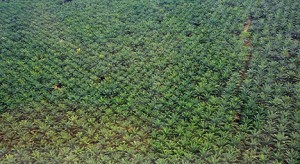
This is the third and final installment in a series of posts that endeavors to answer a simple question: What is sustainable palm oil?
The answer, of course, is anything but simple.
The first blog post in this series explored the weaknesses of the Roundtable on Sustainable Palm Oil (RSPO), the dominant certification standard for palm oil companies. The second post examined the colorful spectrum of positions on “sustainable” palm oil from environmental advocacy groups to scientists and industry.
The real question still remains to be answered: Can an agricultural commodity like palm oil, which displaces rainforests and peatlands and has heavy ties to slave labor and human rights abuses, ever be considered sustainable?
According to the US Department of Agriculture’s website, the word “sustain” implies long-term support or permanence. As it pertains to agriculture, sustainable describes farming systems that are “capable of maintaining their productivity and usefulness to society indefinitely. Such systems… must be resource-conserving, socially supportive, commercially competitive, and environmentally sound.”
Currently, trying to find palm oil that meet’s the USDA’s own definition of sustainability is about as hard as finding a list of Alan Oxley and World Growth Institute’s donors.
Palm oil is the most traded edible oil in the world due to its high yields and cheap prices. But the many environmental and social costs of “cheap” palm oil — rainforest destruction, alienation of local communities from their customary lands and livelihoods — are externalized, meaning that while the market price of palm oil may be low, we’re still paying far too high a price for it. The rainforests of Indonesia and Malaysia, which is where 85 percent of palm oil is grown, contain some of the oldest (older even than the Amazon) and culturally and biologically rich forested ecosystems in the world.
The cost of destroying these natural treasures is not included in the price of palm oil-laden products like Girl Scout cookies or Keebler Grasshoppers — but aren’t these products costing us far too dearly all the same?

As corporations and governments struggle to meet sky-rocketing demand for cheap vegetable oil, where do we look? Are industrial palm oil plantations the answer?
Plain and simple, the industrial palm oil now flooding global markets will likely never be a model of sustainability. In fact, it is the exact opposite — a model of irresponsible and short-sighted agriculture.
However, that does not mean the current system shouldn’t be transformed to create meaningful changes for people and ecosystems already planted with oil palm. By continuing to run effective corporate campaigns we can slowly chip away at this destructive system and the status quo of business as usual. We’re working to tip the scales by creating enough public pressure that our corporate targets embrace solutions in which environmental justice outweighs profit.
For example, imagine an agricultural system that prioritized transparency, accountability, and a diversification of food crops to support a robust local economy rather than an export-based industrial monocrop that strips the local communities of their native lands and food security. Imagine if biodiverse tropical rainforest land was not dished out by corrupt governments for mere pennies, just so they can be turned into desert wasteland. Imagine if, our world’s last remaining rainforests were protected as havens of biodiversity.
There could be strictly enforced and widely respected criteria around agribusiness expansion to ensure that endangered species and Indigenous peoples don’t get displaced. But there aren’t.
Working within this dysfunctional system on near term solutions, even if they may not make the system perfectly sustainable, is essential if we want to protect what’s left. Here are some immediate steps to help mitigate the negative impacts of this destructive industry:
- Stop deforestation. Moving forward we need to figure out how to improve production standards on existing plantations, particularly by resourcing smallholders, and only expand on degraded lands with the free, prior and informed consent (FPIC) of the local forest communities that rely on them. There is no need to expand palm oil plantations on primary forest. Should the Indonesian government prioritize its forest protection and halt all expansion, RAN would clearly be supportive of that. We strongly support a moratorium on expansion of palm oil on primary forest and designating “no go” areas for the industry.
- Companies must demand that the palm oil they buy goes beyond existing RSPO certification. Read the second recommendation in this blog post to learn more about this.
- The RSPO should deny certification certificates to companies that fail to put in place dispute resolution mechanisms. In addition to the many unresolved land disputes from the palm oil industry in Indonesia and Malaysia, agribusiness giants like Malaysian Sime Darby are swiftly moving into Cameroon, Ghana and Liberia creating yet additional widespread land conflicts and natural forest conversion. Sime Darby is a Cargill supplier.
- The RSPO standard must be strengthened. RSPO membership and even RSPO certification is not enough to protect rainforests. According to the advocacy coordinator for the SPKS, an independent union of oil palm farmers, “What I see in discussions is very different than what happens in reality on the ground in RSPO certified plantations and an even bigger gap in non RSPO certified plantations. The number of land disputes is growing by the day. The RSPO is a way for companies to legalize their crime through smallholder schemes.”
While the limits of large-scale industrial agriculture likely can never yield “sustainable” palm oil, we must continue to push the limits of our current system, because doing so means the protection of real acres, the defense of diverse forest communities, and the only hope of creating a future for critically endangered species like Sumatran orangutans and tigers.